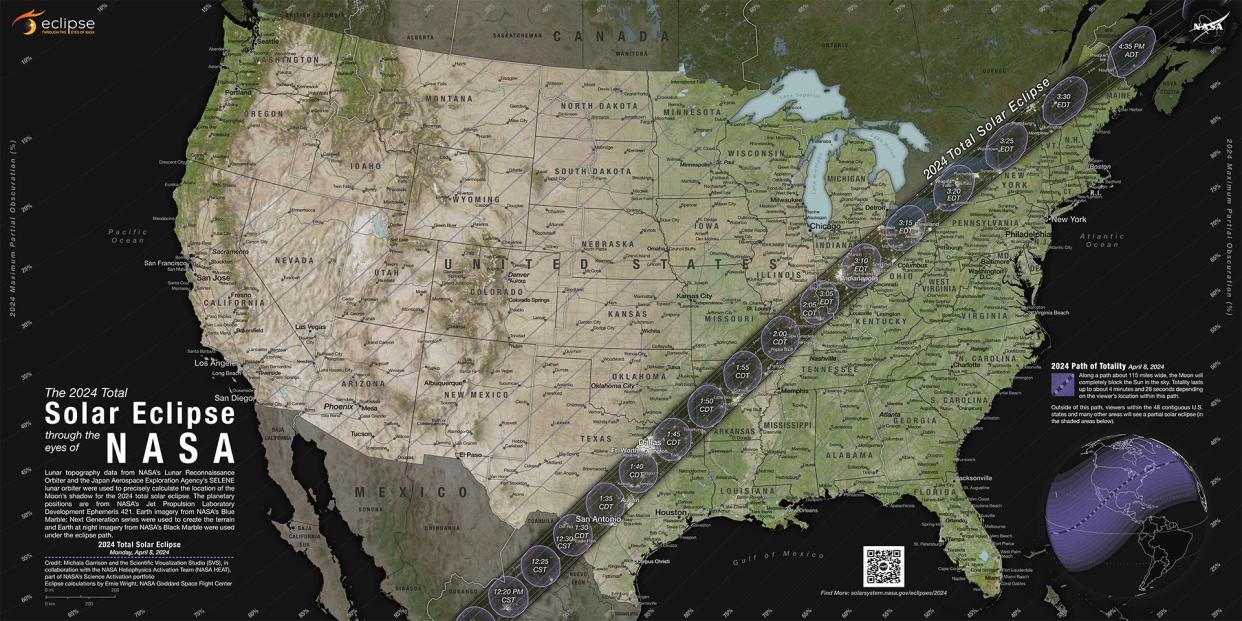Cape Cod eclipse forecast: Fun in the sun or cloud cover bummer?
A big shadow show is headed for Cape Cod on Monday, when a partial solar eclipse will temporarily stifle the sun's supremacy. Our closer celestial pal, that puny but plucky moon, will pass in front of the sizzling star, and we will be served an enthralling dollop of darkness.
While the Cape isn't in the path of totality, where folks will be treated to a total solar eclipse, we're pretty darn close. Locations on the Cape can expect the moon to cover nearly 90% of the sun at the height of the eclipse event.
In the skunk-at-the-picnic department, some might wonder if anything could put a damper on the extravaganza. The answer would be mostly cloudy or overcast skies, which could create poor viewing conditions for the eclipse, according to the National Weather Service.

Will it be cloudy or sunny for the partial solar eclipse on Cape Cod?
We are now within the National Weather Service's seven-day forecast window. Here's their predicted weather for Monday, April 8: "Sunny, with a high near 52. Northwest wind around 11 mph."
"Conditions look favorable," said Bill Leatham, a meteorologist at the National Weather Service Boston/Taunton office.
However, Leatham said eclipse fans should continue to check the forecast as we get closer to Monday. That's because forecasts gain accuracy as they get closer to the day in question.
But there is certainly reason to be optimistic about weather conditions for the upcoming eclipse. According to the National Oceanic and Atmospheric Administration (NOAA), "a seven-day forecast can accurately predict the weather about 80% of the time and a five-day forecast can accurately predict the weather approximately 90% of the time.
A cool eclipse tool
The U.S. Navy's Astronomical Applications Department has a very cool Solar Eclipse Computer tool on their website at aa.usno.navy.mil/data/SolarEclipses.
Users can plug in their location to find out when the eclipse will begin in their area, when it will peak and when it will end. The tool also provides information about the duration time of the eclipse and what percentage of the sun will be obscured.
What is a total solar eclipse?
According to NOAA, solar eclipses "occur when the Moon passes between the Sun and the Earth, causing the Moon to cast a shadow on a portion of the Earth’s surface."
A total solar eclipse occurs when "the Moon aligns perfectly with the Sun and covers the entire solar disk, resulting in a momentary darkening of the sky, according to NOAA.
What time is the eclipse on Cape Cod?
According to Eclipse2024.org, the April 8 eclipse event will run from about 2:15 p.m. to about 4:40 p.m. in Hyannis, with approximately 90% of the sun being blocked by the moon shortly after 3:30 p.m.
How to safely view the eclipse
Protecting your eyes is paramount during an eclipse. Here is important information from NASA:
"Looking directly at the sun without proper eye protection is unsafe EXCEPT during the brief total eclipse phase ('totality'). This happens ONLY within the narrow path of totality. At all other times, it is safe to look directly at the sun ONLY through special-purpose solar filters, such as 'eclipse glasses,' that comply with the transmittance requirements of the ISO 12312-2 international standard. Ordinary sunglasses, even very dark ones, are not safe for looking at the sun.
"If you are inside the path of totality on April 8, 2024, remove your solar filter ONLY when the Moon completely covers the sun’s bright face. As soon as the sun begins to reappear, replace your solar filter to look at the remaining partial phases.
"Outside the path of totality, there is NO TIME when it is safe to look directly at the sun without using a solar filter that complies with the transmittance requirements of the ISO 12312-2 international standard."
The American Astronomical Society maintains a curated list of approved vendors of safe solar viewers and filters on their website.
Eric Williams, when not solving Curious Cape Cod mysteries, writes about a variety of ways to enjoy the Cape, the weather, wildlife and other subjects. Contact him at ewilliams@capecodonline.com. Follow him on X: @capecast.
Thanks to our subscribers, who help make this coverage possible. If you are not a subscriber, please consider supporting quality local journalism with a Cape Cod Times subscription. Here are our subscription plans.
This article originally appeared on Cape Cod Times: Cape Cod eclipse weather forecast: Will conditions be clear or cloudy?
